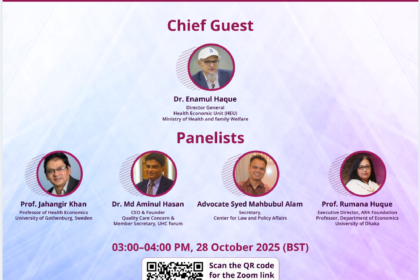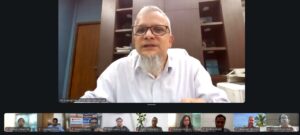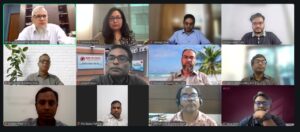
Universal Health Coverage (UHC) is essential to ensure health equity and the right to healthcare in Bangladesh. Alongside rapid urbanization, the burden of non-communicable diseases is increasing, and the number of urban-poor is rising. Although community clinics and upazila health complexes exist to serve rural populations, people still do not receive adequate and necessary services. Bangladesh remains significantly behind in the service coverage index of UHC. To address this, large investments must be made in primary healthcare. Speakers shared this view during a webinar titled ‘The Path to Universal Health Coverage in Bangladesh: Bridging the Gaps’, held on Tuesday (28 October 2025). The session was organized by ARK Foundation and conducted via Zoom.
 Dr. Md. Enamul Haque, Director General of the Health Economics Unit, Ministry of Health and Family Welfare (MoHFW), attended as the Chief Guest of the webinar. The panelists included Professor Jahangir Khan, Professor of Health Economics, University of Gothenburg (Sweden); Dr. Md. Aminul Hasan, CEO & Founder of Quality Care Concern and Member Secretary of the UHC Forum; Advocate Syed Mahbubul Alam Tahin, Secretary, Centre for Law and Policy Affairs; and Professor Dr. Rumana Huque, Executive Director of ARK Foundation and Professor, Department of Economics, University of Dhaka. The session was moderated by Badruddin Saifi, Research Associate at ARK Foundation.
Dr. Md. Enamul Haque, Director General of the Health Economics Unit, Ministry of Health and Family Welfare (MoHFW), attended as the Chief Guest of the webinar. The panelists included Professor Jahangir Khan, Professor of Health Economics, University of Gothenburg (Sweden); Dr. Md. Aminul Hasan, CEO & Founder of Quality Care Concern and Member Secretary of the UHC Forum; Advocate Syed Mahbubul Alam Tahin, Secretary, Centre for Law and Policy Affairs; and Professor Dr. Rumana Huque, Executive Director of ARK Foundation and Professor, Department of Economics, University of Dhaka. The session was moderated by Badruddin Saifi, Research Associate at ARK Foundation.
As Chief Guest, Dr. Md. Enamul Haque highlighted ongoing government initiatives and reform efforts, “Universal Health Coverage is essential to ensure health equity and the right to healthcare in Bangladesh. Recognizing this, thirty-five ministries have already signed a declaration on multisectoral collaboration. The Health Reform Commission has submitted 33 proposals to accelerate UHC. The government is committed to implementing the necessary policy and institutional reforms to improve financial protection and equitable access to healthcare.”
Professor Dr. Rumana Huque emphasized that achieving UHC requires transformation of the entire health system: “UHC is not just about financing; it is a comprehensive reform process. Strengthening primary healthcare, ensuring a functional referral system, and reducing out-of-pocket costs for essential medicines are key. Many people still depend on pharmacies for treatment, significant gender gaps persist in service delivery, and third-gender individuals face multiple barriers in accessing healthcare. Several regions are lagging behind in UHC indices. These areas need urgent attention.”
From a legal and rights-based perspective, Advocate Syed Mahbubul Alam stated, “civil society must be part of UHC policymaking. The tobacco control model shows that strong collaboration between the government and civil society can dismantle syndicates and drive real reform.”
Sharing international experience, Professor Jahangir Khan said, “Bangladesh has skilled professionals, but without strong political leadership, reforms cannot translate into system-wide change.”
Dr. Md. Aminul Hasan stated, “after COVID-19 and the Ukraine war, poverty and inflation have increased. Achieving UHC by 2030 has become more challenging. The Health Care Financing Strategy adopted in 2012 aimed to reduce out-of-pocket health expenditure, but instead, it has increased. We must rapidly expand primary healthcare access, increase the number of skilled health workers, and strengthen digital health infrastructure.”
More than fifty representatives from public health organizations, tobacco control experts, media representatives, and private institutions participated in the webinar.



